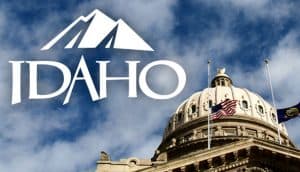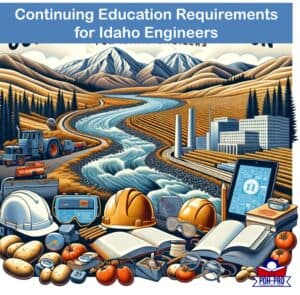CEU Requirements for Idaho Professional Engineers
If you are registered in the State of Idaho, you may be wondering – What are the continuing education requirement for Idaho professional engineers?
The requirements for continuing education requirements for professional engineers for the state of Idaho are as follows: (1) completion of 30 PDHs, (2) the renewal frequency is biennially and it happens on the last day of the licensee’s month of birth, (3), the maximum number of PDHs that can be carried over to the next renewal cycle are 30, (4), the courses offered for the awarding of PDH credits can include managerial, ethical, or technical content and must aim at maintaining, improving, and broadening the knowledge and skills of a engineer, and (5), the renewal date is the last day of an engineer’s month of birth.
Continuing education is essential for professional engineers to stay on top of their field – and licensure. Being informed and aware of state requirements for license renewal prevents the possibility of expiration or rejection. Alabama has its own expectations for renewing professional engineer licenses.
Idaho engineers can earn continuing education credits by completing one of our complete packages.
For a summary of all license renewal requirements check out our Idaho PE renewal page.
Required Idaho Engineering PDH Credits
It’s important to note that the renewal period is biennial and a total of 30 PDHs are required for completion. The licensing board in the state of Idaho is the Idaho Board of Licensure of Professional Engineers and Professional Land Surveyors (IBLPEPLS). Engineers have to undertake courses that improve and increase their capacity as practicing engineering practitioners. The courses can take the following categories: ethical, technical, or managerial.

It’s significant to take note that IBLPEPLS does not do pre-approval of course providers and courses. Rather, it’s the mandate of engineers to determine whether the course activities they are taking meet the requirements and standards of the board. The board requires that the course activities aimed at awarding PDHs be relevant to one’s engineering practice, and also aim at increasing and expanding one’s engineering skills and knowledge. In this respect, it’s imperative to highlight that the board allows electronic renewal. It’s also of interest to note that, upon request, the board requires the submission of certificates of completion of continuing education credits for audit purposes. Moreover, an engineer must keep records for a maximum of 6 years.
Idaho PE License Renewal Dates
The renewal date for licensure is the last day of an engineer’s month of birth. Those born in even years have their licenses expiring in even years while those born in odd years have their licenses expiring in odd years. Once one embarks on the course for license renewal, 30 PDHs should be completed in a span of 2 years. There has to be a clear objective for every activity undertaken which is to improve the level of competence, knowledge, and professionalism of an engineer. Upon completion of the courses, record keeping is mandatory for a licensee and it has to be up to a maximum of 6 years.
Engineering Ethics and Professional Conduct
Engineering ethics, professional conduct, and state laws/ rules are of great significance. The basis of this is that engineers should demonstrate high levels of ethical standards, professional image, and adherence to state rules and laws. It’s in this respect that continuing education courses have these essential elements in place.
The value of ethics is that an engineer is able to learn how to act in the right moral codes while in engineering practice. Similarly, professional conduct equips a professional engineer with the capacity to display a superior level of professionalism while at work. For the state rules and laws, they equip engineers with the necessary knowledge to operate within the legal parameters expected of them. So, as engineers in the state of Idaho take continuing education courses, they have to make sure that they serve the above-mentioned aims to qualify for PDH credits.
Records Keeping Requirements for ID Engineers
Engineers should keep records to support their acquisition of credits. In Idaho, professional engineers should keep records for a maximum period of 6 years. The evidence that the board requires is completion certificates and any other documents showing the proof of continuing education course attendance. For example, the board requires a log showing the following: the type of activity undertaken, location, sponsoring institution, duration, instructor’s name, and the PDHs earned. These records must be presented to the board when an engineer is subject to an audit.
Continuing Education Activities Accepted by the Idaho Engineering Board
According to IBLPEPLS, the continuing education activities that are accepted are the ones that aim at maintaining, improving, and broadening the skills and knowledge of an engineer. Again, the activities should be relevant to one’s engineering discipline. This implies that what might be relevant to one engineer might not be relevant to another. Therefore, the board has the final authority to determine whether an activity taken meets the standard requirements for PDH credit or not. Here are examples of activities that the board accepts as continuing education:
- Enrolling for online PDH courses
- Taking part in engineering conferences, workshops, trainings, and conventions
- Participating in engineering webinars
- Publishing articles, papers, and books
- Tutoring in engineering-related activities
- Undertaking documented study
- Acquiring patents
Online courses for continuing education are allowed and there is no limit to the number of PDHs that one can earn. Additionally, live webinars play a pivotal role in meeting the requirement for continuing education in Idaho. They are a convenient way through which engineers can earn PDHs especially those who can’t have on-site continuing education activities. Lastly, it’s worth noting that self-study courses are allowed as long as they are relevant and improve one’s engineering skills and knowledge.
Pre-Approval of Continuing Education Activities
The board does not pre-approve course providers or courses for continuing education. Therefore, an engineer should determine if the activities taken are relevant and whether they meet the requirements of the board.
Sources of Free Continuing Education Courses
There are sources of free continuing education courses for professional engineers that one can consider. They include: educational websites, learning institutions, and professional engineering bodies. Once you have the right information, you can go ahead and apply for the courses.
Idaho Engineering Licensing Requirements
- A bachelor’s degree certificate in engineering from an accredited engineering program
- Enrolling and passing the fundamentals of engineering examination
- A four-year continuous experience in an engineering field
- Passing the Principles and Practice of Engineering test- assesses one’s knowledge and proficiency in his or her specific engineering field
Engineering Discipline Restrictions for Continuing Education Courses
The state of Idaho’s engineering board restricts the courses an engineer can take based on their particular engineering license. This means that the courses that engineers take have to be relevant to their specific engineering disciplines. For example, if one has a license for mechanical engineering, the courses have to be relevant to that field.
The above information is fundamental to professional engineers in Idaho. It provides a summary of the guidelines needed for continuing education. Thus, a professional engineer has to follow the information keenly in order to earn relevant PDH credits for the improvement and advancement of one’s engineering practice.
